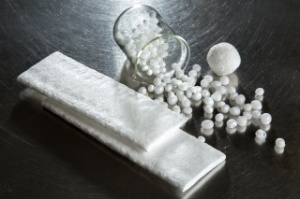An environmentally friendly alternative for polystyrene
While it is used all over the world as a light packaging and insulation material, EPS (expanded polystyrene) is a problem as waste. This is why VTT Technical Research Centre of Finland is currently developing an affordable and environmentally friendly alternative for polystyrene from PLA bioplastic, which is derived from organic sources.
The annual production volume of EPS is 5–6 million tonnes per year. Usually this non-biodegradable material ends up on waste tips or is disposed of by burning, which results in compounds that are hazardous to health.
PLA (polylactide) is a bioplastic made from renewable materials with the help of lactic acid. VTT is investigating methods of foaming bioplastics to make beads that are further refined into products such as insulation sheets, using methods typical of EPS manufacturing processes.
The expansion of the bioplastic by foaming is carried out with consideration for the environment, using carbon dioxide. The density and heat insulation properties of the new biomaterial are similar to those of polystyrene. VTT plans to take its development work closer to industrial processing and to proceed from laboratory work to factory testing. Therefore, in order to collaborate in this development it is now looking for partners from among companies operating in the field.
PLA products similar to polystyrene already exist, but their problem is their high price. In collaboration with companies operating in the field, VTT will be looking for new and more efficient production methods to enable the manufacturing of affordable products.
VTT is also developing a process for PLA based on extrusion foaming, in order to replace polystyrene in traffic and packaging applications, for example.



